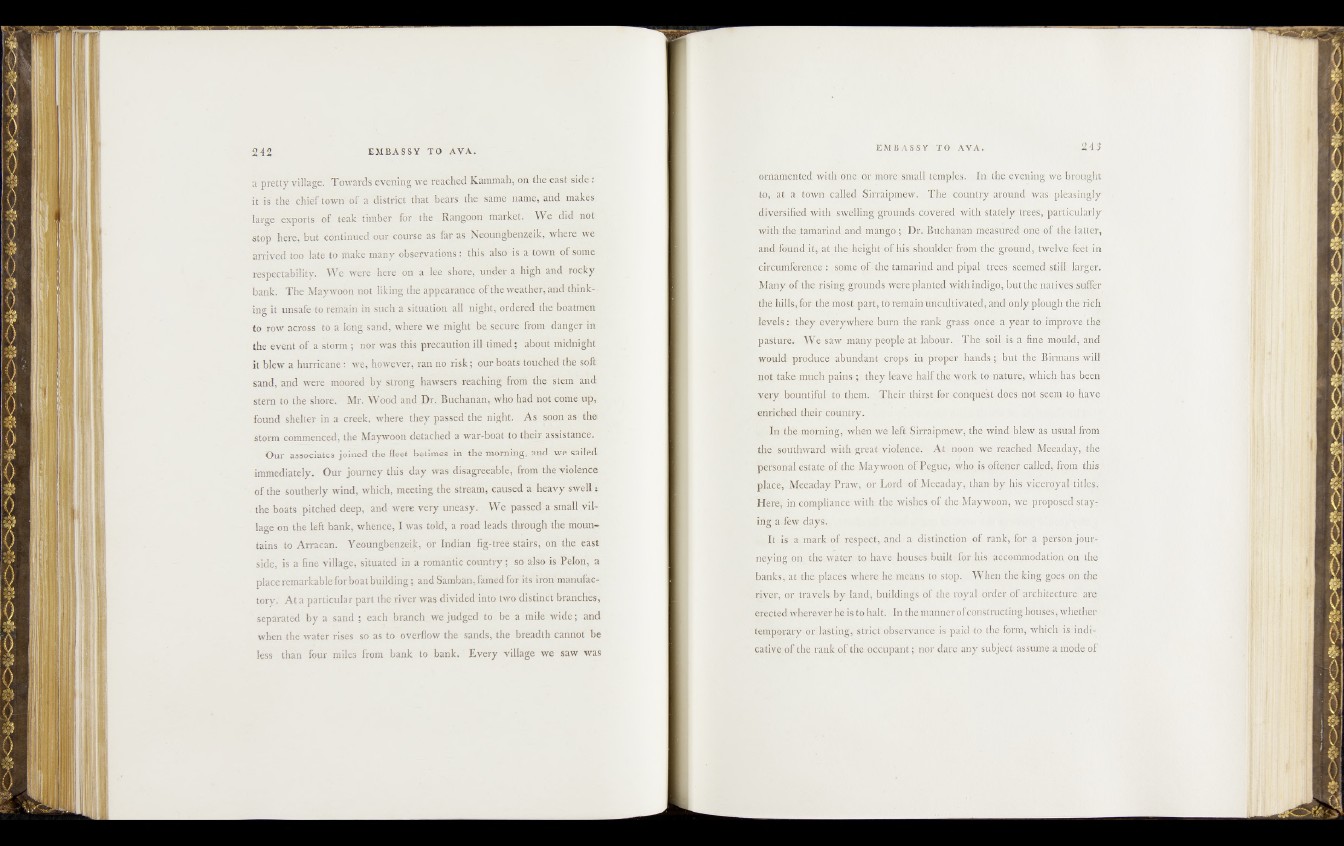
a pretty village. Towards evening we reached Kammah, on the east side:
it is the chief town of a district that bears the same name, and makes
large exports of teak timber for the Rangoon market.-' We did not
stop here, but .continued our course as far as Neoungbenzeik, where we
arrived too late to make many observations.: this also is a town óf some
respectability. We were here on a lee shore, under a high and rocky
hank. The Maywoön not liking the appearance of the weather, and think- -
ing it unsafe to remain in such a situation all night% ordered the boatmen
to row across' to k long sand, where we. might be secure from dangefin
the event of a stórm; nor'was this precaution ill timed; 'about midnight
it blew a hurricane: we, however, ran no risk ; our boats touched the soft
sand, and were moored by strong hawsers reaching from the stem and
stem to the shore. Mr. Wood and Dr. Buchanan, who had not come up,
found shelter in a creek, where they passed the night. As soon as the
storm commenced, the MaywoOn detached a war-boat to their assistance.
Our associates joined the fleet betimes in the morning, and we sailed
immediately. Our journey this day was disagreeable, from the violence
of the southerly wind, which, meeting, the stream, caused a heavy swell i
the boats pitched deep, and were, very uneasy. W e passed a small village
on the left bank, whence, I was told, a road leads through the mountains
to Arracan. Yeoungbenzeik, or Indian fig-tree stairs, on the east
side, is a fine village, situated in a romantic country; so also is Pelon, a
place remarkable for boat building; and Samban, famed for its iron manufactory.'
At a particular part the river was divided into two distinct branches,
separated by a sand ; each branch we judged to be a mile wide; and
when the water rises so as to overflow the sands, the breadth, cannot be
less than four miles from bank to bank. Every village we saw was
or6atngntedj wi|ft<|p^Qr inoiffinmllliiinplL-' In» we brought
to, it tounitCtdlcd1! SjalJnptnd« 1 htmo'cmtj\ aiqipid}n as; pfc.iMngly
«kuofstfii.d nith#stv.dhn4--,louiidMCoracdJiAul''>f iic jv ^uaypauicylfrlyi
wlh'diL i uri unid;.uid.m mgo :,lDf.* BucMVui! ipcd^uA&oji^ol ,Llieil'atter,
and,fotmdu£a\u rlibjhetgbyof Ins sfruildu fi/yu Che,' m
eirnudfuLiito . „wme otfrlic Liniiiiml and ptjuljLfi’tA ■, sci. i n 1 kff-iVff1-
Alauv of the using gioimdt were pi miod w uluiuligu' Ruil ilit-iiautcïj.iaflu
the lulls lor themos.Êpui.töiiu'i.tianimuvliiv t^cd“1.m.cÈpfl^prwj,ghTlii licit
loyeh « theAn’eycu^whotei bunkdJ^ajtl^fiytajurfiAs i t Oüijftfa.ia'spiq,tl5^
IpiaSture., We saw many.people a l.tlxmi. j 'BhuÏ
^vuiikhsprodm rtbund.mi- impstpffipryj.pu& 11 and yak brut, thc^Blpntn&w til
not take milch p.tms.:» th(.y Lavddial thi^woik l(a n < ftin ^ ^W )jiu i bciti$
Very bountiful to them 1 h u r thirst- tm
enriched thefijcoifeitEy.
In thbimoming, when we lelt Suiaijmtow .the windjJ»ic\vj,ayr ufinyrpm
the southward wh^:gr^bt.rviolence.. A > -w cf,fcaêhedtM e c a e j l i e
jpejsonal estate of the May woon 61 ^feguc, wliopy ofiynei. cdllul^nlji^m thisd
place, Meoaday F law ,,or land ol Muoaday., than-|jy h j^ j^ t'^ y id jtiile ^
Here, in compliance with the wishes of tfie Mayvwjpm, ^eyprpposud stay^1
iri^kfe^o d f i ^ j f
It is a mark of respect, and a distinction of rank, for a person journeying
on the.water to have houses built for his accommodation on the
banks,.at the places where he means to stop. When the king goes on the
river, or travels by land, buildings of the r >y al Order of architecture are
erected w herevér he is to halt In the m timer of c onslrtu ting houses, whether
temporary or lasting, strict observance is paid t o ||||i form, which is indicative
of the rank of the occupant; nor dare any subject assume a mode of'